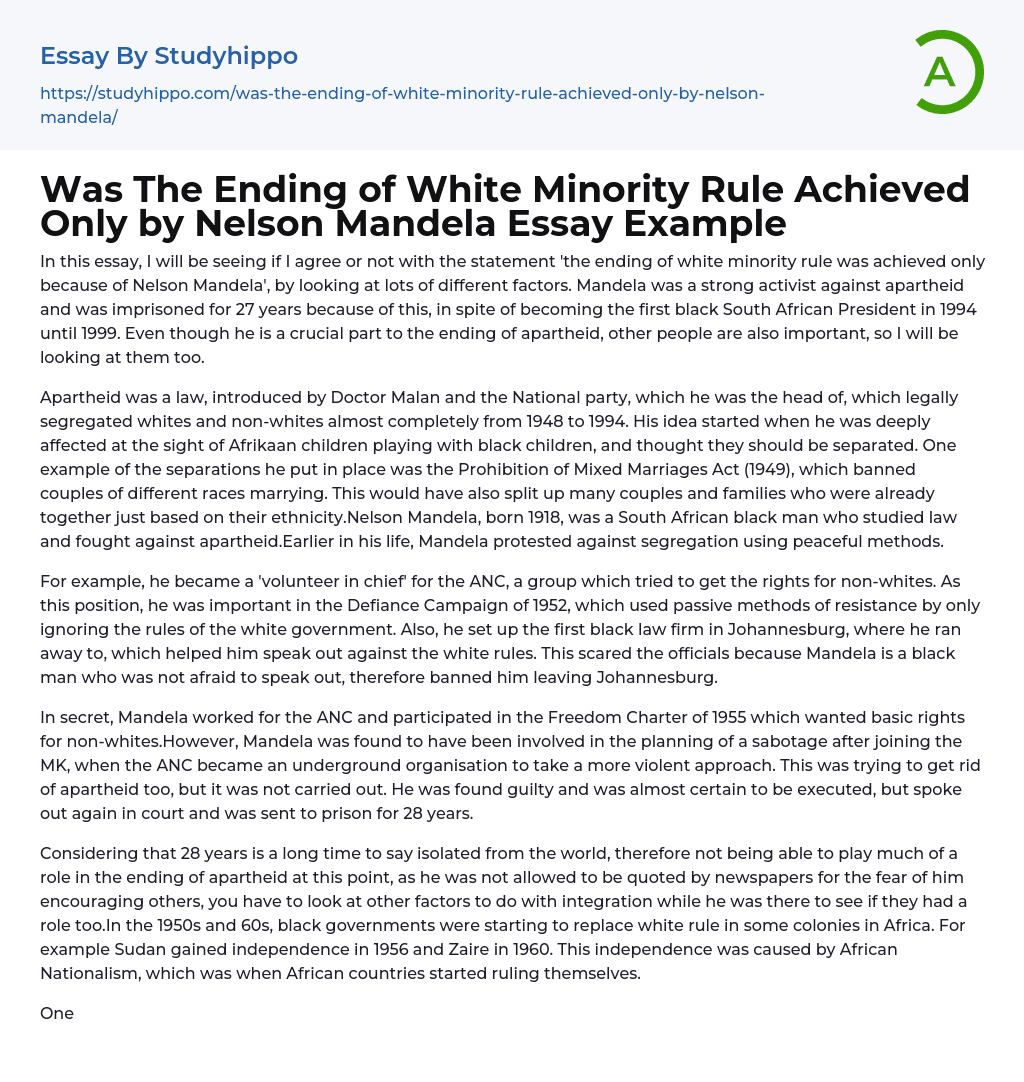

Was The Ending of White Minority Rule Achieved Only by Nelson Mandela Essay Example
My objective is to evaluate whether or not I concur that Nelson Mandela was solely responsible for the end of white minority rule. To achieve this, I will analyze multiple factors. Despite being a notable anti-apartheid advocate and enduring 27 years in prison for his resistance, Mandela is not the only influential figure involved in ending apartheid whom I will scrutinize. Although he ultimately became South Africa's first black President from 1994 to 1999.
Doctor Malan and the National party introduced Apartheid in 1948, which legally separated whites and non-whites. Doctor Malan believed that Afrikaan children should be segregated from black children, leading to the implementation of laws such as the Prohibition of Mixed Marriages Act (1949), preventing couples of different races from marrying and separating families based on ethnicity. Nelson Mandela was born in 1918, s
...tudied law, and peacefully protested against apartheid.
In his role as the "volunteer in chief" for the ANC, Nelson Mandela played a critical part in fighting for rights for non-whites. One significant event where he was crucial was during the Defiance Campaign of 1952, employing passive resistance by breaking rules set by white officials. Mandela also established Johannesburg's first black law firm after fleeing there and used it as a platform to speak out against white rule. His unwavering courage as an outspoken black man made authorities uneasy, leading them to ban him from leaving Johannesburg.
Despite his covert work with the ANC and his contribution to the Freedom Charter of 1955 as a member of a nonviolent movement seeking basic rights for non-white individuals, Mandela's involvement with the more radical MK organization resulted in him plotting an act of sabotage aimed
at dismantling apartheid. Although he was not put to death for his actions, Mandela was convicted and given a 28-year prison sentence after making statements in court.
Despite being restricted from public speaking for 28 years due to fears of inciting others, Nelson Mandela's role in ending apartheid was limited. Therefore, it is crucial to acknowledge other integration factors during his time. In the 1950s and 60s, various colonies in Africa saw the replacement of white rule with black governments. African Nationalism led to self-governance by African countries, resulting in independence for nations such as Sudan in 1956 and Zaire in 1960.
African Nationalism led to the Sharpeville Massacre where members of the African National Congress and Pan African Congress were shot from behind by police at a peaceful protest in Sharpeville demanding a change in the Pass Law. This incident shocked nations like the USA, Britain, and France and allowed them to provide support towards ending apartheid. Additionally, African Nationalism also prompted other countries to get involved in South Africa's situation.
In his speech, Macmillan, who was the British Prime Minister during that era, expressed his dislike for Apartheid and called for its abolition stating, '...
The objective is to establish a community that respects the individual's rights. The South African government is questioned for claiming that blacks have equal rights, as it was crucial for attracting international attention and bringing the issue to the forefront. This would have influenced the government to eradicate apartheid, as seen in the considerable pressure exerted by the UN, OAU, and Lusaka Conference on South Africa. The UN, a prominent country, was significant, and every African nation sought to participate in ending
apartheid. The Lusaka Conference emphasized condemning racism and related points.
This pressurised South Africa because it was a large organisation that could defy the government. African Nationalism gained support from other countries and helped to replace white governments, ultimately contributing to the end of apartheid. Mandela played a crucial role in this process by both sneaking out to bring attention to the situation and by actively participating in campaigns such as the Defiance Campaign and the Freedom Charter. Overall, I believe that Mandela's contributions were more significant in ending apartheid.
- Euthanasia essays
- Assisted Suicide essays
- Censorship essays
- Gun Control essays
- Empowerment essays
- Civil Rights essays
- Capital Punishment essays
- Death Penalty essays
- Human Trafficking essays
- Sex Trafficking essays
- Gay Marriage essays
- Affirmative Action essays
- Child Labour essays
- Privacy essays
- Speech essays
- Child Protection essays
- Corporal Punishment essays
- Police Brutality essays
- Gun essays
- Death Penalty Pros And Cons essays
- Is The Death Penalty Effective essays
- The victim essays
- Public Speaking essays
- Freedom Of Speech essays
- Free Speech essays
- Persuasive Speech essays
- Gettysburg Address essays
- Informative Speech essays
- Abortion essays
- Abuse essays
- Animal Rights essays
- Animal Testing essays
- Assault essays
- Bullying essays
- Controversial Issue essays
- Crash essays
- Cyber Bullying essays
- Feminism essays
- Human Rights essays
- Immigration essays
- Inequality essays
- Poverty essays
- Prejudice essays
- Racism essays
- Torture essays
- Violence essays
- Equality essays
- Gender equality essays
- Gender Inequality essays
- Minority essays



